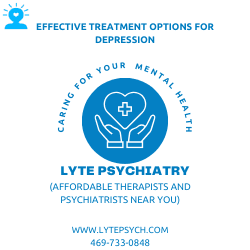Wed May 08 2024
Effective Treatment Options Available at Lyte Psychiatry to Managing Depression (Best Adults and Adolescents Psychiatrist and Therapist Near You), Affordable Therapist and Psychiatrist, Dallas, Fort Worth, TX

Comprehensive Treatment Options for Depression at Lyte Psychiatry (Best Adults and Adolescents Psychiatrist and Therapist Near You)
Depression, affecting over 264 million people worldwide according to the World Health Organization, is a leading cause of disability that impacts various aspects of life. Lyte Psychiatry is dedicated to providing a wide range of effective treatment options tailored to the unique needs of each patient.
Tailored Medication Management
At Lyte Psychiatry, we understand that medication management is an effective depression treatment. Antidepressants are beneficial for about 60% of patients, as per the National Health Services. Our psychiatrists carefully consider each patient’s health history, symptoms, and preferences to select the most appropriate medication. This personalized approach helps optimize treatment outcomes and minimize side effects.
Advanced Psychotherapy Techniques
Psychotherapy is another critical component of our treatment strategy. Cognitive Behavioral Therapy (CBT) and Dialectical Behavior Therapy (DBT) are proven to be highly effective, with studies indicating that CBT can improve conditions in 50-75% of patients experiencing depression.
At Lyte Psychiatry, these therapies are tailored to address the specific patterns of thought and behavior that contribute to each patient’s condition, thereby enhancing the therapeutic experience and outcomes.
Holistic Approaches to Treatment
Recognizing the interconnection between body and mind, Lyte Psychiatry incorporates holistic approaches into our treatment plans. This includes mindfulness techniques, which have been shown to significantly reduce symptoms of depression by helping patients engage with the present moment in a non-judgmental way.
Nutritional counseling and structured physical activity programs are also offered, acknowledging their positive effects on mental health.
Supportive Group Therapy Sessions
Group therapy is an effective treatment modality that offers the benefit of peer support. It provides a platform for sharing experiences and coping strategies under the guidance of a professional. The collective experience helps individuals understand that they are not alone, fostering a community of support which is essential for managing depression.
Cutting-Edge Treatment Technologies
For individuals with treatment-resistant depression, Lyte Psychiatry offers Transcranial Magnetic Stimulation (TMS). TMS is a non-invasive procedure that uses magnetic fields to stimulate nerve cells in the brain. With about a 50-60% response rate, it is a promising option for those who have not benefited from traditional treatments.
Continuous Support and Aftercare
Depression treatment is an ongoing process that often requires long-term management strategies. Lyte Psychiatry is committed to providing continuous support through regular follow-up appointments, ongoing medication management, and adjustments to therapy to ensure patients remain on track.
Seek Help and Diagnosis at Lyte Psychiatry (Affordable Therapist & Psychiatrist Near You)
If you're feeling overwhelmed by depression, remember that help is available and effective. Reach out to Lyte Psychiatry today to begin your path to recovery. Our dedicated team is ready to assist you with a personalized treatment plan and ongoing support, ensuring you have the resources to manage and overcome depression.
To Schedule an appointment. Click Here
To see our services. Click Here
Call us if you haves questions at 469-733-0848
FAQs
Q: What should I expect during the initial consultation for depression treatment?
A: The initial consultation typically involves a comprehensive evaluation where a psychiatrist will assess your symptoms, medical history, and any prior treatments.
Q: How quickly can I expect to see results from depression treatment?
A: Response times can vary, but many patients begin to notice improvements within the first few weeks of starting treatment. Full benefits from therapy and medication might take several months to manifest fully.
Q: Are there alternative treatments available for those who prefer not to use medication?
A: Yes, Lyte Psychiatry offers several non-medication treatments such as psychotherapy, TMS, and lifestyle interventions which can be effective on their own or in combination with other treatments.
Q: Is it necessary to continue treatment after symptoms improve?
A: Ongoing treatment is often recommended to prevent relapse. Many individuals benefit from continued therapy or medication management even after their symptoms have improved.
Q: How do I know if I need professional help for depression?
A: If you are experiencing persistent sadness, loss of interest in activities, changes in sleep or appetite, fatigue, or feelings of worthlessness, it's important to seek professional help.